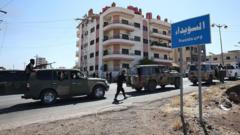Renewed sectarian clashes in Suweida prompt Syrian leadership to intervene as violence claims nearly 600 lives, with allegations against government forces intensifying.
**Syria Plans Military Deployment to Curb Sectarian Violence in Suweida**

**Syria Plans Military Deployment to Curb Sectarian Violence in Suweida**
The Syrian presidency announces troop deployment to address escalating clashes amidst rising casualties.
The Syrian presidency has declared its intention to deploy a new military force to quell the ongoing sectarian violence in southern Syria, particularly in the city of Suweida, where deadly confrontations between Bedouin and Druze fighters have intensified. Interim President Ahmed al-Sharaa's office has called on all involved parties to show restraint as reports circulated this week of renewed fighting.
Since the outbreak of these skirmishes on Sunday, almost 600 individuals have lost their lives, triggering severe unrest in the region. Residents have accused government troops of executing Druze civilians without trial, raising alarm and prompting a chaotic situation in Suweida. Amid these tensions, Israel conducted airstrikes targeting Syrian positions to alleviate military pressure in the province.
Recently, U.S. Ambassador to Turkey, Tom Barrack, stated via social media platform X that a ceasefire agreement had been reached between Israel and Syria, a claim that has not been publicly validated by either side. The agreement, allegedly supported by neighboring countries Turkey and Jordan, calls for an end to violence and urges various ethnic groups, including Druze, Bedouins, and Sunnis, to collaborate in fostering a united national identity.
Shortly after the announcement of the proposed military response, an Israeli official disclosed that Israel had consented to the temporary entrance of Syrian Internal Security personnel into Suweida, allowing for the protection of Druze civilians due to the ongoing unrest. The Druze community, predominantly residing in Suweida, adheres to a unique faith which is a derivative of Shia Islam and has longstanding suspicions towards the current jihadist-led government in Damascus.
Concerns over escalating sectarian animosity against the Druze population have prompted widespread concern across the country, according to reports from a BBC correspondent stationed in the Syrian capital. The Druze, who constitute a minority in Syria—similar to their status in Lebanon and Israel—are increasingly finding themselves at risk due to the pervasive violence.
Earlier this week, UN human rights chief Volker Türk revealed that credible accusations of serious human rights violations, including summary executions and arbitrary killings, have come to light in Suweida, implicating both government forces and various armed groups. Türk emphasized the urgent need to halt this violence and hold violators accountable, condemning the ongoing bloodshed.
In a televised address earlier in the week, President Sharaa expressed his commitment to ensuring the protection of the Druze community and vowed accountability for those responsible for the violence. He attributed the bloodshed to "outlaw groups" that have consistently avoided dialogue.
As the international community watches with concern, the situation in Suweida remains precarious, with calls for peace and unity growing louder among minority groups facing the brutal reality of sectarian conflict.


















